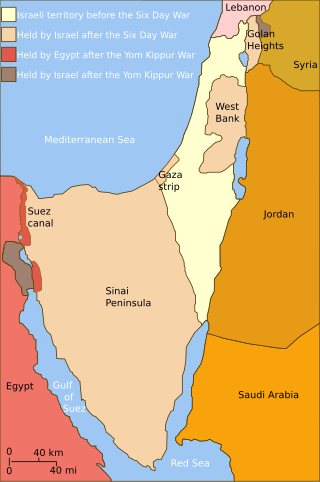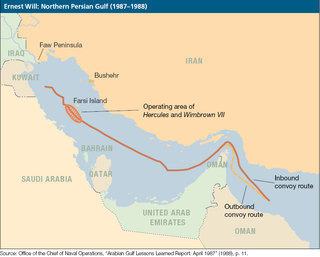
United Nations Security Council resolution 660, adopted on 2 August 1990, after noting its alarm of the invasion of Kuwait by Iraq, the council condemned the invasion and demanded Iraq withdraw immediately and unconditionally to positions as they were on 1 August 1990.

United Nations Security Council Resolution 362 was adopted by the U.N. on October 23, 1974. The Security Council decided that, although the Middle East remained quiet, the situation was still volatile, and therefore this Security Council resolution extended the mandate of the United Nations Emergency Force for another six months, until April 24, 1975. The Council commended the Force and those governments supplying men to it for their contributions and expressed its confidence that the Force would be maintained with maximum efficiency and economy. The Resolution also reaffirmed that the Force must be able to function militarily in the whole Egypt-Israel sector of operations without differentiation regarding the UN status of the various contingents.

United Nations Security Council Resolution 368, adopted on April 17, 1975, recalled previous resolutions and considered a report from the Secretary-General before calling upon the parties involved in the prevailing state of tension in the aftermath of the Yom Kippur War to immediately implement resolution 338. The Council then renewed the mandate of the United Nations Emergency Force for another three months until July 24, 1975, and requested the Secretary-General submit a report on the developments in the situation and the measures taken to implement the resolution.

United Nations Security Council Resolution 369, adopted on May 28, 1975, expressed concern over the prevailing state of tensions between Israel and Syria and reaffirmed that the two previous agreements on disengagements of forces were only a step towards the implementation of resolution 338. The resolution then decided to call upon the parties concerned to immediately implement resolution 338, renewed the mandate of the United Nations Disengagement Observer Force for another 6 months and requested the Secretary-General submit a report on the situation at the end of those 6 months.

United Nations Security Council Resolution 378, adopted on October 23, 1975, considered a report by the Secretary General and noted the developments in the situation in the Middle East. The Secretary General viewed any relaxation in the search for peace at that time to be especially dangerous and urged for a resolution to the situation, namely through the adaption of the plan laid out in resolution 338.

United Nations Security Council Resolution 381, adopted on November 30, 1975, considered a report by the Secretary-General regarding the United Nations Disengagement Observer Force and noted the discussions the Secretary-General had with all the concerned parties to the Middle East situation. The council expressed its concern over the continuing tension in the area and decided to:

United Nations Security Council resolution 479, adopted unanimously on 28 September 1980, after reminding Member States against the use of threats and force in their international relations, the Council called upon Iran and Iraq to immediately cease any further uses of force and instead settle their dispute through negotiations.

United Nations Security Council resolution 540, adopted on 31 October 1983, noting the report of the Secretary-General and the increased cooperation from the governments of Iran and Iraq, the Council requested he continue with the mediation efforts in the region.

United Nations Security Council resolution 552, adopted on 1 June 1984, after hearing complaints from Bahrain, Kuwait, Oman, Qatar, Saudi Arabia and the United Arab Emirates regarding attacks on their ships by Iran, the Council condemned the attacks, reiterating that Member States should refrain from using threats or use of force in their international relations.

United Nations Security Council resolution 616, adopted unanimously on 20 July 1988, after hearing representations from the Islamic Republic of Iran, the Council expressed its distress at the downing of Iran Air Flight 655 over the Strait of Hormuz by a missile from the United States Navy cruiser USS Vincennes during the conflict between Iran and Iraq.

United Nations Security Council resolution 619 was a resolution adopted unanimously on 9 August 1988 by the United Nations. The resolution came after recalling Resolution 598 (1987) and approving a report by the Secretary-General Javier Pérez de Cuéllar on the implementation of paragraph 2 of Resolution 598.

United Nations Security Council resolution 631, adopted unanimously on 8 February 1989, after recalling resolutions 598 (1987) and 618 (1988) and having considered a report by the Secretary-General Javier Pérez de Cuéllar on the United Nations Iran–Iraq Military Observer Group, the Council decided:

United Nations Security Council resolution 642, adopted unanimously on 29 September 1989, after recalling resolutions 598 (1987), 618 (1988) and 631 (1989) and having considered a report by the Secretary-General Javier Pérez de Cuéllar on the United Nations Iran–Iraq Military Observer Group, the Council decided:

United Nations Security Council resolution 651, adopted unanimously on 29 March 1990, after recalling resolutions 598 (1987), 619 (1988), 631 (1989) and 642 (1989), and having considered a report by the Secretary-General Javier Pérez de Cuéllar on the United Nations Iran–Iraq Military Observer Group, the Council decided:

United Nations Security Council resolution 670, adopted on 25 September 1990, after recalling resolutions 660 (1990), 661 (1990), 662 (1990), 664 (1990), 665 (1990), 666 (1990) and 667 (1990) on the topic of Iraq, the council condemned the continued Iraqi occupation of Kuwait, the violence against Kuwaiti citizens and its defiance of Security Council resolutions. It also noted the expulsion of Iraqi diplomats from several countries. As a consequence, the Council decided to impose further sanctions on Iraq, relating to civil aviation.

United Nations Security Council resolution 671, adopted unanimously on 27 September 1990, after recalling resolutions 598 (1987), 619 (1988), 631 (1989), 642 (1989) and 651 (1990), and having considered a report by the Secretary-General Javier Pérez de Cuéllar on the United Nations Iran–Iraq Military Observer Group, the Council decided:

United Nations Security Council resolution 676, adopted unanimously on 28 November 1990, after recalling resolutions 598 (1987), 618 (1988), 631 (1989), 642 (1989), 651 (1990) and 671 (1990), and having considered a report by the Secretary-General Javier Pérez de Cuéllar on the United Nations Iran–Iraq Military Observer Group, the Council decided:

United Nations Security Council resolution 685, adopted unanimously on 31 January 1991, after recalling resolutions 598 (1987), 618 (1988), 631 (1989), 642 (1989), 651 (1990), 671 (1990) and 676 (1990), and having considered a report by the Secretary-General Javier Pérez de Cuéllar on the United Nations Iran–Iraq Military Observer Group, the Council decided:

United Nations Security Council resolution 1280, adopted on 3 December 1999, after recalling resolutions 1242 (1999), 1266 (1999) and 1275 (1999) concerning the Oil-for-Food Programme, the council, acting under Chapter VII of the United Nations Charter, extended provisions relating to the export of Iraqi petroleum or petroleum products in return for humanitarian aid for one week until 11 December 1999.

The nations of Iraq and Mexico established diplomatic relations in 1950. Both nations are members of the United Nations.










